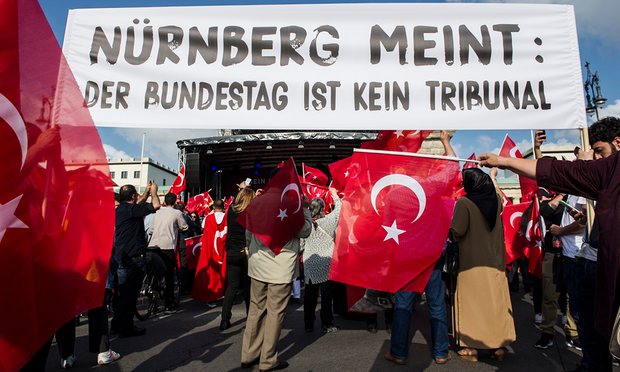On Wednesday he had gone further, saying the ballot was “ridiculous” and arguing that the killings were an “ordinary” wartime event. Yıldırım repeated the warning from the Turkish president, Recep Tayyip Erdoğan, that bilateral ties would be damaged by Germany’s decision to call the massacre of Armenians by Ottoman forces a genocide.
The agreement to return migrants arriving on the Greek islands to Turkeyhas in recent months reduced the number of refugees arriving in central Europe, easing pressure on Merkel, the German chancellor. But Erdoğan has since repeatedly questioned the conditions of the deal, with members of his party threatening to cancel the agreement altogether.
Opening Thursday’s debate, Germany parliament speaker Norbert Lammert acknowledged that addressing historical events can be painful.
“But we have also seen that an honest and self-critical appraisal of the past does not endanger relations with other countries,” he said. “In fact, it is a precondition for understanding, reconciliation and cooperation.”
He said Turkey’s current government is not responsible for what happened 100 years ago, “but it shares responsibility for what happens with it in the future”.
Some historians argue that Germany, a close ally of the Ottoman empire during the first world war, was aware of the massacre at the time and supported it politically. The Bundestag’s resolution contains a passage acknowledging “the German Reich’s complicity in the events”, as well as six references to the Holocaust.
Over the course of the one-hour debate, the German Green party’s Turkish-German co-chair Cem Özdemir argued that the resolution was “not about pointing fingers or claiming the moral high ground”, but came from “a historic duty to encourage Turkish-Armenian reconciliation in friendship”.
Both members of the Turkish and the Armenian embassy in Germany were present during the vote, with the latter group holding up signs reading “Recognition Now – Thank You” at the end of the session.
Twenty governments, including those of France, Italy and Russia, have in the past described the mass killings of Armenians as a genocide, and Pope Francis referred to the killings as “the first genocide of the 20th century” in 2015. The German president, Joachim Gauck, also used the phrase in a speech in April last year.
Thursday’s vote was originally scheduled for last year, but was put on ice due to pressure from Germany’s governing coalition, reportedly for fear of destabilising Turkish-German relations.


























